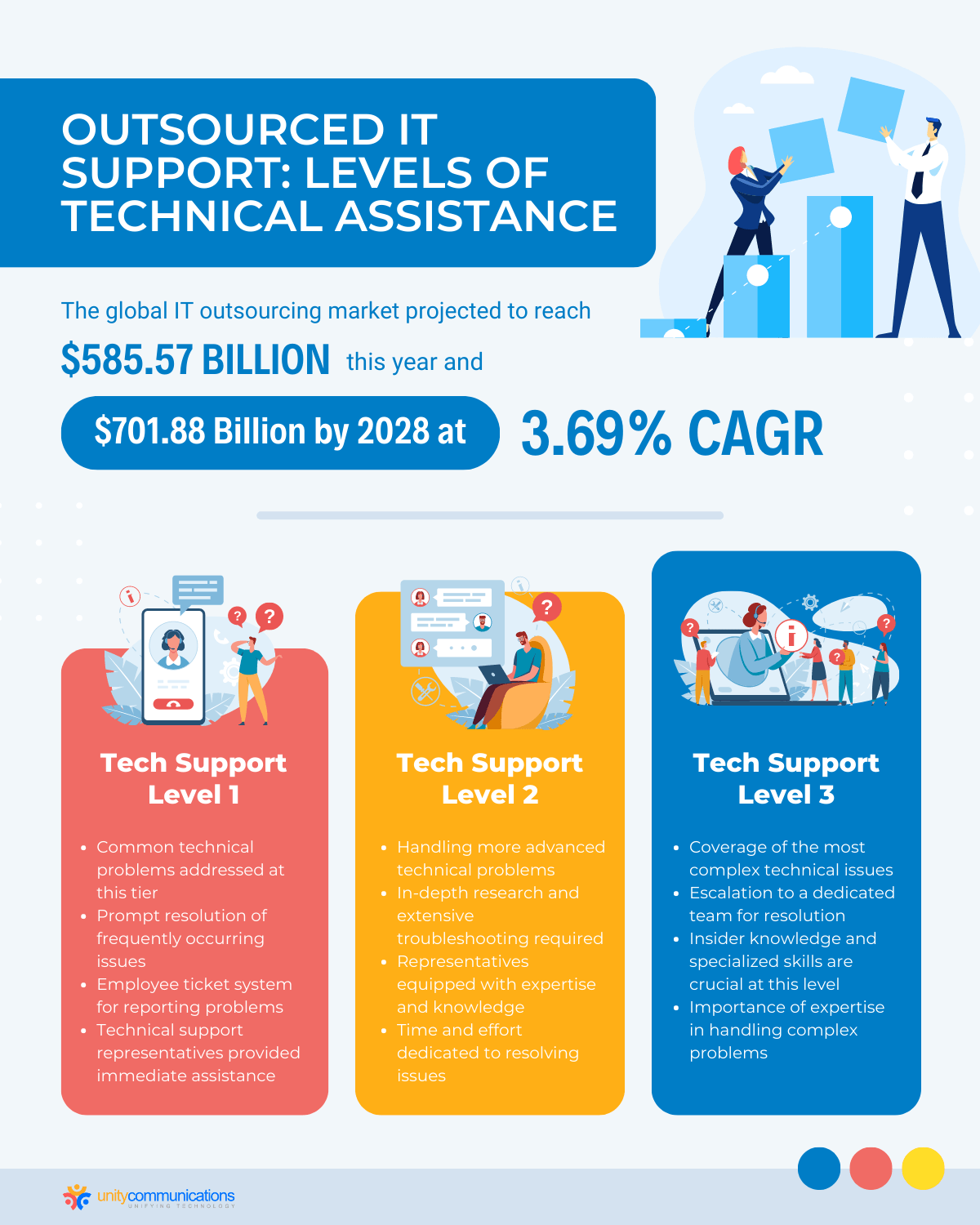Table of Contents
Companies of all sizes now integrate technologies into their business processes. These resources streamline workflows, optimize products or services, and meet customer needs.
But technological resources are subject to failures and breakdowns. Maintaining existing technological resources and deploying new ones require knowledge and expertise. That’s where technical support comes in.
Consider outsourced technical support to achieve operational success. Learn more from this quick guide to outsourcing tech support.
Technical Support as an Outsourcing Service

Technical support outsourcing involves tapping into an external vendor to handle tech support services. The third-party service provider serves as a help desk. They have representatives who answer questions, provide customer support, and troubleshoot.
To understand tech support as an outsourcing service, let’s define some key terms.
- Technical support provides a wide range of specialized services to customers. It involves products such as computers, mobile phones, software, and other electronic devices. Solving technical issues rather than simply assisting customers in using products is at its core.
- Business process outsourcing (BPO) is when a third-party service provider handles parts of business operations (processes, functions, or tasks). It includes back-office outsourcing, such as data entry and IT support. It also covers front-office work such as customer service, telemarketing, and technical support.
How Outsourcing Technical Support Works
Technical support outsourcing involves a team of representatives provided by your third-party vendor who deals with your customers experiencing technical issues. They deliver services through phone calls, email, or live chat.
Outsourced technical support is not simply tapping into a BPO company’s workforce and resources. It goes beyond helping customers and fixing technical issues. It’s about pursuing a long-term business partnership to achieve operational success.
The global IT outsourcing market might reach $395 billion this year at an 8.26% compound annual growth rate (CAGR). It’s no surprise that more companies are outsourcing IT support.
Technical support as an outsourcing service allows you to access:
- A solid remote workforce with technical knowledge, skills, and expertise
- Networks and systems for configuring and maintaining devices
- Hardware and software for continuous business operations
- System monitoring for performance, security, and compliance.
Duties and Responsibilities of Technical Support

Technical support focuses on resolving technical issues. Still, it has a vast scope of work that organizations group into three levels.
- Tech Support Level 1: This tier deals with common technical problems. When employees encounter frequently occurring technical issues, they raise a ticket. Technical support representatives resolve these almost immediately.
- Tech Support Level 2: This level handles more advanced technical problems, requiring more time and effort. The representatives perform in-depth research and extensive troubleshooting to resolve issues.
- Tech Support Level 3: Support at this level covers the most complex technical issues. Insider knowledge, skills, and expertise are vital. As such, regular representatives escalate these to a dedicated team for actual resolution.
The duties and responsibilities of technical support vary from one level to another. Specifically, technical support representatives handle tasks such as:
- Serving as the first point of contact for employees and customers encountering technical issues
- Assisting customers and providing updates on actions taken
- Examining hardware and software and troubleshooting technical problems
- Replacing or repairing product parts or components
- Diagnosing and fixing technical errors
- Checking and resolving network issues
- Examining system issues and performing necessary updates
- Filing instructional manuals and warranties
- Reporting technical support requests and actions taken
- Testing and assessing new technologies.
Top Reasons for Outsourcing Technical Support

Outsourcing comes with several benefits. NTT reports that 45% of companies plan to increase outsourcing due to the pandemic. About 48% of their leaders recognize the need to optimize their working environment. They are looking to hire talent and bring in new skills.
Technical support, when outsourced to a third-party provider, is a type of BPO. Here’s why you should consider outsourcing this service:
- Ensure 24/7 Technical Support. Most BPO providers operate 24 hours a day, seven days a week. They have a team of representatives working on shifts. Outsourcing provides a tech support team ready to help your customers with technical problems. Whether you outsource data entry services, customer service, or technical support, consider a 24/7 BPO company.
- Save on Labor and Production Costs. Deloitte identifies cost reduction as the top outsourcing reason amid the pandemic. It topples other common business objectives such as flexibility and agility. You can save on labor and production expenses when outsourcing technical support.
- Leverage Knowledgeable and Skilled Experts. Technical support requires expert knowledge, advanced skills, and specialization. Think of customers needing help with fixing mobile phones or troubleshooting computers. It can be hard to look for and hire employees best suited for technical support. Outsourcing gives you access to reliable experts.
- Access Advanced Facility, Technology, and Resources. Technical support usually deals with troubleshooting and fixing electronic devices. It demands the best infrastructure, latest technologies, and updated resources. You get instant access to these vital resources when outsourcing. You can optimize your technical support function and scale your business.
- Achieve a Boost in Performance. Technical support requires a solid help desk and effective troubleshooting. Boost your business performance with access to experts and the latest technologies. Outsourcing helps you meet your key metrics and achieve your business goals. The right BPO company can improve service, efficiency, quality, and customer satisfaction.
- Scale and Grow Your Business. Technical support as an outsourcing service is a front-office task requiring direct customer interaction. Its impact on your customers and business is significant. If poorly done, it can hamper business success. Otherwise, your BPO company should be able to scale and grow your business.
How To Get Started With Outsourcing Technical Support

Now you know the benefits of outsourcing technical support. But how do you start outsourcing? Here are crucial steps to take:
Step 1. Know the Types of Outsourcing
Whether you outsource data entry or technical support, consider three BPO options:
- Onshore BPO: Onshore outsourcing is hiring another company in the same country. For instance, an e-commerce business works with a tech firm in its region.
- Nearshore BPO: Nearshore outsourcing involves employing a company from a nearby country. For example, a U.S.-based business hires a Canadian tech company for IT support.
- Offshore BPO: Offshoring is working with an overseas third-party service provider. For instance, a company in the U.S. hires a BPO company in Asia.
Step 2. Identify Organizational Problems and Needs
Before outsourcing, assess your business first. You might have some challenges in some of your operations. For instance, you encounter frequent backlogs in your administrative functions. If so, hire back-office outsourcing services.
As for your tech support department, some common problems include:
- Backlogs
- Unassisted customers
- Outdated systems (software and hardware)
- Unresolved tickets
- Customer complaints
Step 3. Start Looking for a BPO Company
After identifying business problems, seek a vendor that can help address your concerns. Crucial factors to consider include:
- BPO reputation: Check business licenses, certifications, awards, and customer ratings.
- Experience: Ensure your hired BPO provider has extensive experience in the industry.
- Expertise: Make certain your contracted BPO company specializes in technical support.
- Workforce: Investigate employees’ knowledge and skills in technical support.
- Resources: Ensure the vendor has the latest technologies and resources for support.
- Scalability: Work with a provider that can adjust when you upscale or downscale.
- Pricing: Study the pricing model and see if it suits your business.
Step 4. Create a Service-level Agreement
After hiring a BPO company, create a service-level agreement for your technical support. You must first set key performance indicators (KPIs). From there, share these key metrics with your hired BPO service provider.
KPIs for technical support usually include:
- Efficiency: This metric measures how many cases technical support representatives can handle. It also tracks how efficient they are in resolving technical issues.
- Quality: This metric measures how effectively technical support representatives resolve issues. It also monitors their compliance with business policies.
- Customer satisfaction (CSAT): This metric measures how satisfied customers are. You’ll most likely receive a high CSAT score if you resolve their technical issues.
You and your service provider should work together to achieve a common goal.
Step 5. Prepare for the Transition to BPO Operation
Preparation is key to business operation success. Prepare for your technical support as an outsourcing service. Take note of the following:
- Business objectives
- Key metrics
- Workforce
- Infrastructure
- Technology
- Other resources
Strive to have a smooth transition in your technical support operation.
Step 6. Maintain Constant Communication and Collaboration
The work doesn’t end when you kick off your BPO operation. You must continue to do the following:
- Ensure constant communication and collaboration with your third-party service provider
- Check on your tech team and offer help and support
- Track the account’s progress and employee performance
- Make some changes and adjustments whenever necessary
The Bottom Line
Robust technical support is integral to business success. Your company needs experts to handle technical problems to ensure that operations are not disrupted. Outsourcing is the key to achieving operational success in technical support.
But outsourcing technical support is no easy feat. It requires industry knowledge, skills, specialization, and even educational background. Make sure to hire and work with a reliable BPO service provider.
Consider the information discussed above. Capitalize on the BPO benefits and follow the outsourcing steps recommended here in this article. Understanding tech support as an outsourcing service will help you make informed decisions.



